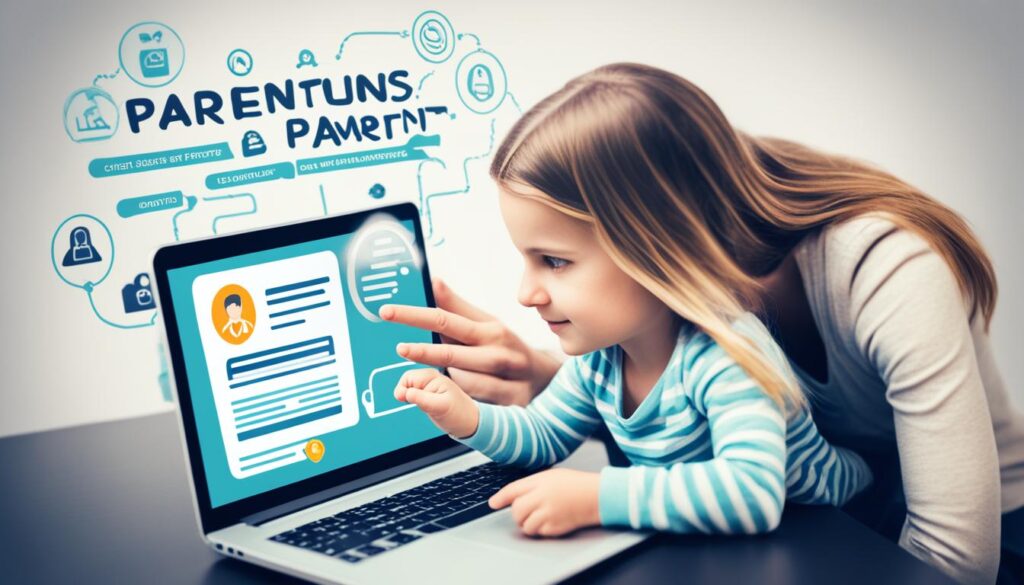Digital Parenting
Navigating the Digital World: Empowering Parents and Protecting Children
Navigating the digital world requires parents to stay vigilant and informed to ensure their children's safety and well-being in the online realm.

Empowering parents is key to navigating today’s digital world. Kids face both chances and dangers online. Digital tools bring education, global ties, and creativity, but also cyberbullying, bad content, and online creeps. **Informed caregivers** can start chats about online safety, keep an eye on what kids do online, and step in to ensure good experiences. By **learning digital tools**, setting boundaries, and making rules, parents can stop cyberbullying, encourage smart choices, and protect emotional health. Exploring the digital age shows us the need for balance and smart ways to keep the internet safe.
Key Takeaways
• Parents should be informed about digital tools to facilitate open dialogue and monitoring of online activities for a safer digital experience.
• Establishing clear guidelines and teaching boundaries, privacy, and consent helps prevent cyberbullying and online exploitation.
• Actively engaging in children's online activities and monitoring interactions helps prevent risks and promotes responsible online behavior.
• Understanding the benefits and risks of digital tools is crucial for empowering parents to protect their children in the digital world.
• Empowering children to navigate the digital world safely requires a balance between educating them on digital tools and monitoring their online activities.
The Digital World's Double Edge
The digital landscape, akin to a double-edged sword, presents both immense opportunities and potential pitfalls for children, making it essential for parents to navigate this complex terrain with awareness and caution.
On one hand, digital tools offer a wealth of educational resources, global connections, and creative expression.
On the other hand, they also pose risks such as cyberbullying, online predators, and exposure to inappropriate content.
It is vital for parents to be aware of these dual aspects and take proactive measures to guarantee their children's online experiences are positive and safe.
Empowering Parents for a Safer Tomorrow
Parental empowerment is key to maneuvering the complexities of the digital landscape. Informed and vigilant caregivers are better equipped to guide their children through the vast expanse of online opportunities and risks. To achieve this, parents must understand digital tools, recognizing both their benefits and drawbacks. By doing so, they can facilitate open dialogue, teach boundaries and consent, and monitor online activities.
This proactive approach enables parents to intervene when necessary, ensuring their children's online experiences are positive and safe. By empowering parents, we can foster a safer digital environment for our children, allowing them to harness the benefits of digital tools while minimizing the risks.
Navigating Online Risks and Dangers

As parents navigate the digital landscape, it is crucial to acknowledge the darker corners of the internet, where cyberbullying, online predators, and explicit content lurk, posing significant threats to children's well-being. It is vital to recognize the risks associated with digital tools to safeguard children's safety online.
| Online Risk | Description | Impact |
|---|---|---|
| Cyberbullying | Verbal abuse or harassment online | Emotional distress, anxiety |
| Online Predators | Adults posing as children to exploit minors | Physical harm, emotional trauma |
| Explicit Content | Inappropriate or harmful material | Desensitization, unhealthy attitudes |
| Online Grooming | Adults building relationships with minors for exploitation | Emotional manipulation, abuse |
The Power of Parental Guidance
Regularly, parents who take an active role in guiding their children's digital experiences can greatly mitigate the risks associated with digital tools and foster a safer online environment.
By understanding digital tools and facilitating open dialogue, parents can prevent cyberbullying and teach children about boundaries, privacy, and consent.
Monitoring online activities and educating children on recognizing and reporting suspicious behaviors online is essential.
Parents should establish clear guidelines and boundaries for digital usage at home, encouraging responsible usage and promoting a positive online experience.
Finding Balance in the Digital Age

In today's digital landscape, where the benefits of digital tools are undeniable, finding a balance between harnessing their potential and mitigating their risks is essential for ensuring a safe and healthy online experience for children.
Parents must understand both the positive and negative aspects of digital tools to guide their children safely. By actively engaging in their children's online activities, parents can monitor interactions, prevent potential risks, and encourage responsible usage.
Establishing clear guidelines and boundaries for digital usage at home is vital. By striking a balance between the benefits and risks, parents can empower their children to navigate the digital world confidently and safely, fostering a positive and healthy online experience.
Frequently Asked Questions
What Are the Warning Signs of Online Predation in Children?
"Silent stalkers" often exhibit subtle signs, such as secretive behavior, excessive screen time, or sudden interest in older friends; parents should be vigilant for changes in their child's behavior, mood, or online interactions to detect potential online predation.
How Can Parents Set Digital Ground Rules Without Being Too Restrictive?
Parents can establish digital ground rules by setting clear expectations, encouraging open communication, and monitoring online activities while fostering independence, ensuring a balance between freedom and protection, and adapting rules as children mature.
Are Educational Apps and Games Truly Effective in Learning?
"Seventy-three percent of parents believe educational apps improve their child's learning outcomes. Effective educational apps and games can be valuable learning tools, as they engage children interactively, promoting critical thinking, problem-solving, and skill development."
How Can Parents Supervise Online Activities Without Invading Privacy?
Parents can strike a balance between supervision and privacy by setting clear boundaries, engaging in open dialogue, and using monitoring tools that respect children's autonomy, while fostering trust and educating them on online safety and responsibility.
What Is the Recommended Daily Screen Time for Children of Different Ages?
"Screen savvy parents should safeguard sanity by setting sensible screen time schedules: under 2 years, none; 2-5 years, 1 hour; 6-12 years, 2 hours; 13+ years, 3 hours, ensuring a healthy balance between digital delights and daily duties."
How Can Parents Empower Their Children in the Digital World to Build Self-Esteem and Confidence?
In today’s digital world, parents play a crucial role in empowering their children to build self-esteem and confidence. By establishing open communication, setting boundaries, and being positive role models, can parents cause insecurities in their children to decrease. Encouraging healthy online habits and teaching critical thinking skills can also strengthen their child’s sense of self-worth.
Conclusion
As the digital landscape continues to evolve, it is essential that parents remain vigilant and proactive in guiding their children's online activities.
By acknowledging the dual nature of digital tools, and taking steps to mitigate risks, parents can empower their children to navigate the digital world with confidence and responsibility.
In doing so, we can harness the benefits of digital tools while safeguarding the well-being of our most vulnerable citizens – our children.

Digital Parenting
Navigating Social Media and Online Relationships Tips
Explore our expert tips on Navigating Social Media and Online Relationships to enhance your digital connections safely and wisely.

Did you know **almost half of all millennials** say social media **deeply** affects their love lives? **Experts in modern love fields** like **sex therapy** and **dating coaching** see how platforms like **Instagram, Facebook, Twitter, and Snapchat** stir up **romance**. **Managing digital relationships** is more than just reading texts; a simple ‘like’ or ‘follow’ can mess with **peace of mind**. A **2014 Pew Research Center survey** backs this up, showing the need for real online relationship advice to navigate love in this digital age.
Let’s face it, the consequences of our digital footprints can no longer be brushed aside as trivial. From confronting the discomfort of a partner’s online friendships to the intricacies of addressing past connections lingering on social feeds, the nuances are plenty. Understanding how to set and respect boundaries, engage in empowering social media connection strategies, and weave through this web of digital interactions, is what we aim to demystify. It’s essential we recognize these pixelated landscapes as not just secondary to reality but a substantial battleground where the heart’s battles are often fought and won.
By embracing transparent communication, respecting privacy, and fostering meaningful connections both online and offline, we can transform potential hurdles into stepping stones for stronger bonds. It’s not just about learning the ropes; it’s about crafting them to enrich the very fabric of our relationships. Hence, our focus on providing actionable relationship tips isn’t just a response to a growing trend—it’s our commitment to enhancing the quality and authenticity of modern love in the age of social media.
Key Takeaways
- Understanding the significant impact of social media on romantic relationships is crucial for modern couple dynamics.
- Integrating effective social media connection strategies promotes healthier digital relationship management.
- Transparent communication about online behaviors is essential for maintaining trust and respect between partners.
- Educational online relationship advice is indispensable in helping couples navigate the unique challenges of digital interactions.
- Prioritizing in-person connections and shared experiences provides a counterbalance to social media influences.
Understanding the Impact of Social Media on Relationships
As we delve into the complexities of modern love, the pervasive reach of social media influence on relationship dynamics becomes increasingly evident. In this interconnected era, the digital interaction impact on personal connections invites both scrutiny and understanding. Through our exploration, we aim to elucidate how these virtual engagements alter relationship landscapes and foster emotional effects that are profound and far-reaching.
Real-life Effects of Online Interactions
Digital communication has evolved from a convenience to a staple in fostering and maintaining relationships. The immediacy and accessibility of social media platforms significantly enhance our ability to stay connected. However, they also present unique challenges. Ambiguous digital interactions can create misunderstandings and fuel insecurities, affecting the relationship dynamics in ways that were unheard of before the digital age.
Market Saturation and Uncharted Challenges
Social media’s integration into daily life is now at full saturation, turning it into a vital yet complex component of personal relationships. Experts in relationship dynamics and digital communication have started to tackle these uncharted challenges, noting how these platforms can sometimes govern rather than just influence relationship narratives. This shift can lead to partners fixating on online behaviors, sometimes to the detriment of their real-world connections.
Emotional Consequences of Digital Communication
The emotional effects of online interactions are often dismissed as less genuine or impactful compared to face-to-face encounters. However, the reality suggests otherwise—the sentiments evoked by digital exchanges are intense and can influence personal self-esteem and emotional well-being. It is crucial to acknowledge and address the emotional responses triggered by social media interactions to manage their impact effectively.
In conclusion, while social media platforms continue to offer new ways to connect, they also require us to navigate a landscape filled with new emotional and relational challenges. By understanding the social media influence on relationships and acknowledging the digital interaction impact, we can better manage these modern relationship dynamics.
Establishing Healthy Boundaries in the Digital Age
In today’s interconnected world, the importance of setting boundaries for maintaining a healthy relationship cannot be overstated. The rise of social media and the increasing concern over digital age privacy require new norms and social media guidelines that couples must navigate together. It’s about finding balance and mutual understanding in our digital interactions to foster trust and respect.
The Importance of Open Dialogue
Communication is the cornerstone of any strong relationship, more so in the digital realm where misunderstandings are rife. Openly discussing each partner’s views and comfort levels concerning digital engagement helps set realistic boundaries that cater to the well-being of both.
Identifying Personal and Relationship Needs
Acknowledging individual preferences plays a critical role in the boundary-setting process. It’s important that both parties express what they need from each other regarding online habits to avoid feelings of neglect or disrespect.
Creating Mutually Respectful Online Practices
Together, couples can decide on guidelines that respect both their needs. This might include agreeing on times when digital devices should be put away, or defining what constitutes appropriate interactions with others on social media platforms.
| Aspect | Benefits | Challenges |
|---|---|---|
| Limiting screen time together | Enhances quality time and connection | Finding balance with digital commitments |
| Defining online interaction limits | Builds trust and security | May differ on what is considered appropriate |
| Respecting digital privacy | Promotes individual freedom and confidence | Establishing what is private vs. shareable |

Resolving Conflicts Arising from Social Media Use
In our journey to maintain wholesome digital relationship dynamics, we often encounter hurdles that stem from social media interactions. Successfully navigating these requires a robust conflict resolution strategy tailored to address the unique challenges of social media disagreements and digital relationship conflicts. Here, we discuss the importance of resolving online disputes to fortify relationships.
Effective conflict resolution in the digital sphere hinges on transparent communication and the willingness to understand each partner’s online behavior. It’s crucial to recognize any red flags early and discuss them openly without letting social media dictate the narrative of our relationships. Here is a practical approach to handling these disputes:
- Analyze the root causes of disagreements stemming from social media use.
- Maintain open lines of communication to express concerns about online interactions.
- Jointly define what constitutes appropriate digital behavior for both parties.
Achieving resolution requires both partners to commit to a relationship that stands above digital disruptions, ensuring that the digital world complements rather than complicates their bond.
| Challenge | Strategy | Expected Outcome |
|---|---|---|
| Differential social media habits | Create shared social media usage guidelines | Reduction in misunderstandings |
| Jealousy from online interactions | Discuss boundaries concerning interactions with others | Increased trust and security |
| Insecurity from digital engagement | Regular digital detox and quality time together | Strengthened relationship offline |
In conclusion, these methods are intended to foster an environment where digital tools serve to bring partners closer rather than creating divisions. By addressing social media disagreements and enhancing digital relationship conflict resolution, we can protect the integrity and longevity of our personal connections.
Developing Open and Honest Conversations
As we navigate through the digital age, enhancing our relationships requires us to foster transparent communication and strive for authenticity online. It’s crucial to discuss how social media can influence our personal connections and how being genuine about our feelings can strengthen the bond.
Encouraging Authenticity and Vulnerability
Authenticity serves as the cornerstone of any strong relationship. We encourage partners to be unapologetically truthful in their interactions both offline and online. It’s about shedding the idealized personas often curated for social media and embracing the real, sometimes messy, aspects of their personalities.
Discussing Expectations and Fears
Setting expectations is not just about establishing what is acceptable but also addressing any underlying fears. Transparent conversations about how each partner uses social media and their comfort levels with different types of interactions are essential. It helps prevent misunderstandings and builds a framework of trust.
Formulating Mutual Agreements on Social Media Use
To navigate the complexities of online engagement, formulating social media agreements that respect individual preferences is key. Deciding together on aspects like privacy settings, friend lists, and commenting habits ensures both partners feel secure.
We recognize that every couple’s dynamic is unique, which is why we emphasize customized approaches to these agreements. By aligning on these, partners can avoid potential conflicts and enjoy a harmonious relationship both online and offline.
Adopting Constructive Social Media Etiquette for Couples
In a digital age where connections are often sustained through clicks and comments, it is vital for couples to forge a path that nurtures both their online interactions and offline relationships. By establishing a framework of social media etiquette and respectful online conduct, relationships can flourish, fostering not just romance but mutual respect and understanding as well.
Defining Acceptable Online Interactions
To promote a healthy online environment, defining what constitutes respectful and acceptable online interactions is essential. This includes clear discussions about the extent and nature of interactions with others on social media platforms. The goal is to ensure that all actions are transparent and agreed upon, preventing potential misinterpretations or conflict.
Respecting Privacy and Consent in Online Sharing
Respect and consent in sharing personal or relationship details online are pivotal. Both partners should agree on what information is shared, including photos, relationship status updates, and other sensitive content. This mutual consent honors each person’s privacy and comfort levels, avoiding overexposure and maintaining dignity in the public eye.
Nurturing the Relationship Beyond Social Media
To truly thrive, emphasis must also be placed on offline relationship growth. Engaging in shared interests and spending quality time together without the interference of digital devices allows bonds to deepen and strengthens the connection in a way that virtual interactions simply cannot replicate.
| Online Etiquette Action | Benefits |
|---|---|
| Clear communication about online connections | Deters misunderstandings and builds trust |
| Mutual consent for sharing on platforms | Respects individual privacy and relationship boundaries |
| Routine offline activities | Promotes emotional closeness and personal interaction |

Prioritizing Personal Connections Over Digital Ones
In our increasingly connected world, the art of cultivating personal bonds often gets overshadowed by the convenience of digital interactions. Yet, the essence of personal interaction remains irreplaceable, particularly in nurturing deep, meaningful relationships. By valuing face-to-face connections, we acknowledge the profound impact they have on our emotional health and relational depth.
The Real-life Value of Face-to-Face Interactions
Investing in face-to-face connection allows for a richness of communication that no digital platform can replicate. The nuances of body language, tone of voice, and immediate feedback help in building trust and understanding. Personal interaction in this manner not only enriches our emotional experience but also strengthens our bonds with others in ways that digital communication cannot.
Limiting Screen Time for Relationship Enrichment
Screen time reduction is another critical element in enhancing our personal interactions. By consciously choosing to disconnect from our digital devices, we open up more space for direct engagement with those around us. This not only improves our focus during personal interactions but also demonstrates a commitment to the quality of our relationships.
Choosing Offline Experiences for Deeper Bonds
Actively choosing to engage in offline experiences plays a pivotal role in cultivating personal bonds. Whether it’s shared hobbies, outdoor activities, or simply a conversation over coffee, these experiences foster intimacy and mutual respect, laying a stronger foundation for relationships.
| Activity | Benefits |
|---|---|
| Outdoor walks | Enhances communication, reduces stress |
| Shared meals | Promotes emotional bonding, opportunity for meaningful conversations |
| Arts and crafts | Stimulates creativity, provides relaxed environment for engagement |
By emphasizing these offline interactions, we not only enjoy the inherent benefits of personal engagement but also actively contribute to reducing our overall screen time. This balanced approach not only enriches our lives but ensures that our relationships are defined by quality and depth rather than quantity of interactions.
Protecting Yourself in Online Dating Scenarios
When venturing into the world of online dating, prioritizing online dating safety and protecting yourself are paramount. It’s crucial to cultivate awareness and employ strategic measures against potential dangers such as dating scams and catfishing. The digital dating environment demands vigilance and a prepared approach to these challenges.
Recognizing dating scams involves understanding the typical signs that may indicate deceptive intentions. Be cautious of profiles that rush into intense emotional declarations or ask for financial help. These could potentially be a setup for a scam. It’s also wise to be aware of profiles displaying a lack of detail or inconsistency in their stories.
- Catfishing awareness is knowing the signs when someone might not be who they present themselves online. Pressing for a video call can help verify their identity.
- Always inform a friend or family member about your plans when deciding to meet someone you’ve met online.
- Choose public places for initial meetings to ensure your safety.

Trust your instincts and do not ignore any red flags that may arise while you interact online. Ensuring your physical and emotional well-being should always come first, providing you with confidence and peace of mind in your online dating pursuits.
Remember, an ounce of prevention is worth a pound of cure. Being proactive in protecting yourself can lead to a more secure and positive online dating experience.
In conclusion, while the search for companionship can often lead us to expansive and exciting digital arenas, maintaining safety consciousness is critical. By adhering to these foundational principles of catfishing awareness and scam recognition, we equip ourselves with the necessary tools to navigate these spaces judiciously and joyfully.
Conclusion
In our journey to forge resilient and fulfilling connections, the role of digital relationship management cannot be overstated. As we’ve explored, the path to maintaining harmony within the context of social media and relationships hinges on our ability to demarcate personal boundaries and adapt to the fast-paced digital milieu. It’s through open communication and the collective crafting of relationship strategies that we derive our power to forge not just enduring but also meaningful online and offline bonds.
Addressing the inherent challenges of these digital times requires us to confront disagreements with intent and kindness, to encourage dialogues that are both genuine and transparent, and to nurture a culture of mutual respect. It’s these pillars that anchor our relationships in security and depth. By shifting our focus from the often distorted snapshots of relational bliss displayed across social media to the core elements of trust, privacy, and shared experience, we lay the groundwork for connections that are robust, sincere, and unshaken by the external digital tide.
Lastly, when we discuss online dating conclusions, it’s clear that the digital domain offers both unprecedented opportunities and unforeseen challenges. Yet, the fundamentals remain uniformly vital: protecting our wellbeing, fostering transparency, and embracing authenticity. It’s by adhering to these foundational principles that our relational tapestry remains vibrant and tenacious amidst the ever-evolving landscape of our inter-connected existence. Herein lies the essence of successful relationship strategies — not just in navigating the online world, but in cherishing and upholding the timeless covenant of partnership.FAQ
How does social media influence our romantic relationships?
What are some tips for managing our online relationships effectively?
Why is it important to discuss social media boundaries with our partner?
How can we address conflicts that stem from social media behaviors?
Can setting guidelines for social media use improve our relationship?
How does transparent communication affect online relationship dynamics?
Why is face-to-face communication still important in the age of digital communication?
What steps can we take to prioritize our offline relationship over our social media presence?
How can we protect ourselves from online dating scams and catfishing?
Digital Parenting
Navigating LGBTQ+ Parenting in the Digital Age
Explore tips and insights for LGBTQ+ parenting in the-b digital age, ensuring a safe and inclusive online environment for families.

{“statusCode”:401,”message”:”License key missing”}
Key Takeaways:
- LGBTQ+ youth are at a greater risk for violence and abuse, both online and offline, due to stigma and discrimination.
- NORC and Banyan Communications have developed toolkits to help parents foster healthy relationships and navigate the challenges of the teenage years.
- Acceptance from parents and adults plays a vital role in reducing mental health issues and substance use among LGBTQ+ youth.
- Creating an inclusive online environment for LGBTQ+ families is crucial for their well-being and safety.
- Navigating LGBTQ+ parenting in the digital age requires proactive efforts and open conversations.
Fostering Healthy LGBTQ+ Relationships
In a world where stigma and discrimination persist, LGBTQ+ adolescents face a higher risk of violence and abuse in their relationships compared to their straight and cisgender peers. It is crucial to address this issue and promote healthy relationships among LGBTQ+ youth to ensure their well-being and safety.
According to research, approximately one in three LGBTQ+ adolescents experience bullying at school, and one in four report online abuse. These alarming statistics demonstrate the urgent need for effective resources and support systems.
“Every child deserves to grow up in a loving and nurturing environment, free from fear and abuse. LGBTQ+ youth should not be an exception. We must take proactive steps to foster healthy relationships and protect them from dating violence,”
Recognizing the vital role of education and guidance, NORC and Banyan Communications have developed comprehensive guides specifically designed to help LGBTQ+ youth develop and maintain healthy relationships. These resources provide age-appropriate tips and tools for LGBTQ+ adolescents and their families to navigate relationship challenges, prevent dating violence, and promote well-being.
By equipping LGBTQ+ youth with knowledge about healthy relationships, consent, communication, and respect, these resources aim to empower them to build strong and meaningful connections based on mutual understanding and support.
Moreover, these guides also emphasize the importance of fostering open and supportive environments where LGBTQ+ adolescents feel comfortable discussing relationship issues and seeking help when needed.
Fostering Healthy LGBTQ+ Relationships by NORC and Banyan Communications provides:
- Tips for effective communication and conflict resolution
- Guidance on navigating social media and online relationships
- Information on consent and setting boundaries
- Signs of unhealthy relationships and strategies for addressing dating violence
Empowering LGBTQ+ youth to develop healthy relationships is a collaborative effort that involves parents, educators, and communities. By providing resources and support networks, we can create a safer and more inclusive environment that promotes the well-being and happiness of LGBTQ+ adolescents.
| Benefits of Fostering Healthy LGBTQ+ Relationships | Impact on LGBTQ+ Adolescents |
|---|---|
| Promotes emotional well-being | Reduces the risk of dating violence |
| Enhances self-esteem and self-worth | Improves mental health outcomes |
| Builds healthy communication skills | Reduces experiences of bullying |
| Fosters supportive social connections | Increases resilience in the face of discrimination |
These resources play a crucial role in empowering LGBTQ+ adolescents to navigate relationships with confidence and resilience. By fostering healthy LGBTQ+ relationships, we can create a more inclusive and safe environment for all.
Essential Tips for LGBTQ+ Parenting Teens
Parenting teenagers can be challenging, and LGBTQ+ parents may face additional complexities. As your LGBTQ+ teen navigates the transformative years of adolescence, it’s important to provide guidance, support, and understanding. To help you in this journey, NORC has partnered with Banyan for the CDC’s Division of Violence Prevention to create the resource, “Essentials for Parenting Teens.”
This comprehensive guide offers evidence-based tips and strategies for parents and caregivers of adolescents aged 11 to 17. It addresses the unique aspects of parenting LGBTQ+ teens and offers guidance on building healthy relationships, understanding and supporting their identity, and fostering their emotional well-being.
Here are some essential tips to consider:
- 1. Embrace open communication: Create a safe and non-judgmental space for your teen to express their thoughts, feelings, and concerns. Encourage them to share their experiences, questions, and emotions, and listen actively without interruption.
- 2. Educate yourself: Take the time to educate yourself about LGBTQ+ issues, terminology, and experiences. This knowledge will help you better understand your teen’s perspective and support them effectively.
- 3. Seek support: Connect with LGBTQ+ support groups, organizations, and online communities to find resources and guidance from experienced individuals who have navigated similar journeys. These communities can provide a wealth of insight and support.
- 4. Advocate for your teen: Be their ally and advocate in various settings, such as schools, medical facilities, and social environments. Ensure they have access to inclusive policies, supportive professionals, and equal opportunities.
- 5. Encourage self-care: Help your teen develop self-care practices that support their mental, emotional, and physical well-being. This can include engaging in hobbies, pursuing interests, setting boundaries, and practicing self-compassion.
- 6. Be knowledgeable about online safety: Familiarize yourself with online risks and safety measures to protect your teen in the digital age. Discuss topics like online privacy, cyberbullying, and safe social media practices.
Remember, every teenager is unique, and LGBTQ+ teens have their own specific experiences and needs. Be patient, empathetic, and accepting as you navigate this transformative period together. Your unwavering support will contribute to their well-being and self-confidence.
Finding Supportive Resources
It’s essential to have access to helpful resources that can provide guidance and support throughout your parenting journey. Check out the following organizations and websites:
- The Trevor Project – A leading organization providing crisis intervention and suicide prevention services for LGBTQ+ youth.
- GLAAD – An LGBTQ+ media advocacy organization that offers resources and education for families and allies.
- PFLAG – A national organization that offers support, education, and advocacy for LGBTQ+ individuals, their families, and allies.
Remember, you are not alone in this journey. Reach out to these organizations and others for guidance, support, and connections with like-minded individuals.
Recommended Resources for LGBTQ+ Parenting Teens
| Resource | Description |
|---|---|
| NORC’s “Essentials for Parenting Teens” | A comprehensive guide developed in partnership with Banyan for the CDC’s Division of Violence Prevention, providing tips and strategies for parenting LGBTQ+ teens. |
| The Trevor Project | An organization offering crisis intervention and suicide prevention services for LGBTQ+ youth, including a 24/7 helpline. |
| GLAAD | A media advocacy organization providing resources and education for families and allies of the LGBTQ+ community. |
| PFLAG | A national organization offering support, education, and advocacy for LGBTQ+ individuals, their families, and allies. |
Utilize these resources to enhance your understanding, gain support, and navigate the unique challenges of parenting LGBTQ+ teens with confidence and care.
The Impact of Technology on LGBTQ+ Youth
LGBTQ+ youth embrace technology as a valuable tool that empowers them in the digital age. The internet serves as a safe space where they can connect with peers, explore their identities, and express themselves authentically. Online communities play a crucial role in their lives, providing support and understanding that may be lacking in other environments.
Thorn’s research sheds light on the unique challenges faced by LGBTQ+ youth as they navigate the digital landscape. To seek community, privacy, and acceptance, they gravitate towards online spaces where identities can be freely expressed. As a result, LGBTQ+ youth spend more time in digital spheres compared to their non-LGBTQ+ peers.
“The internet has saved my life many times. It’s the only place where I can truly be myself without fear of judgment or discrimination.” – Anonymous LGBTQ+ youth
This reliance on technology, while beneficial in many ways, does expose LGBTQ+ youth to certain risks. Sharing explicit images or engaging in sensitive discussions are some examples of the challenges they face. Alongside these risks, feeling unsafe and encountering online harassment are also prevalent issues within the community.
Thorn’s research reinforces the importance of creating supportive online environments that prioritize the safety and well-being of LGBTQ+ youth. By addressing these challenges, we can foster inclusive spaces that allow for personal growth, community connection, and positive identity formation.
The following table provides an overview of the impact of technology on LGBTQ+ youth:
| Impact | Description |
|---|---|
| Identity Formation | LGBTQ+ youth utilize technology to explore and establish their identities, finding relatable communities that offer support and understanding. |
| Online communities | Online spaces provide a sense of belonging for LGBTQ+ youth, offering a platform to connect, share experiences, and find support. |
| Increased Risks | Technology exposes LGBTQ+ youth to risks such as sharing explicit images and encountering harassment, necessitating a focus on online safety measures. |
The impact of technology on LGBTQ+ youth is significant and multifaceted. While it provides a lifeline for connection and exploration, it also demands attention to the challenges and risks that come with it. By creating inclusive online spaces and promoting digital safety, we can empower LGBTQ+ youth to navigate the digital world with confidence and security.
Understanding Online Risks for LGBTQ+ Youth
LGBTQ+ youth face specific risks and challenges in the online environment. Research indicates that the sharing of intimate images, also known as sexting, has become increasingly prevalent among young people. Shockingly, approximately 1 in 5 teens admit to sharing their own nudes as a part of their digital interactions.
For LGBTQ+ teens, navigating online risks often involves handling feelings of unsafety on their own, particularly among cis non-hetero males. Due to concerns about outing their sexual orientation or gender identity, they may choose not to report experiences involving grooming, sexting, or the sharing of intimate images to their caregivers. Additionally, the fear of being cut off from their online communities can discourage LGBTQ+ youth from seeking help from their families.
It is crucial that parents of LGBTQ+ children are equipped with the knowledge and resources needed to support their children in navigating the dangers of the digital world. By understanding the unique risks faced by LGBTQ+ youth, parents can provide the necessary guidance and create an open and inclusive environment for their children to seek help and support.
Quotes:
“In the digital age, LGBTQ+ youth encounter specific challenges and risks, including the increased normalization of sharing intimate images. It is essential for parents to be aware of these risks and equipped with the knowledge to support their LGBTQ+ children effectively.” – [Expert Name], LGBTQ+ Youth Advocate
Online Risks Faced by LGBTQ+ Youth
| Risk | Description |
|---|---|
| Grooming | The process of building an emotional connection with a child or teenager to manipulate, exploit, or abuse them. |
| Sexting | The act of sending or receiving sexually explicit messages, photos, or videos through digital means. |
| Leaked Intimate Images | The unauthorized sharing of personal and intimate images, often leading to harassment, bullying, and privacy violations. |

Parents play a crucial role in protecting and supporting LGBTQ+ youth in their online experiences. By staying informed about online risks, fostering open communication, and providing resources, parents can create a safe online environment conducive to the well-being of LGBTQ+ youth.
Including Digital Safety in the Sex Talk
The traditional “sex talk” has become more complex in the digital age, especially when it comes to addressing the impact of technology on sex and dating for LGBTQ+ youth. As parents, it’s crucial to have open and honest conversations with our children about the digital safety considerations specific to their experiences.
One important topic to discuss is sexting. Explain to your child the potential risks involved in sharing intimate images through technology. Discuss the importance of consent, the permanence of digital content, and the potential consequences of sharing explicit photos. It’s crucial to emphasize that they should never feel pressured to send or receive explicit images and that they can always come to you for guidance and support.
Grooming is another topic that needs to be addressed. Talk to your child about the tactics used by online predators to manipulate and exploit vulnerable individuals. Explain that grooming can happen to anyone, regardless of their sexual orientation or gender identity, and that it’s essential to recognize the warning signs and maintain boundaries when engaging with others online.
Maintaining digital safety requires a proactive approach. Educate your child about blocking and reporting options on social media platforms and other online spaces they frequent. Familiarize yourself with safety resources specifically designed for LGBTQ+ youth and share these with your child. Additionally, make sure your child knows about anonymous helplines they can reach out to if they experience any digital safety concerns.
It’s also important to emphasize the role your child can play in helping their friends stay safe online. Encourage them to be supportive peers and provide guidance on how to recognize and address potential risks. Teach them the importance of reporting any concerning behavior they come across online to protect themselves and others.

By including digital safety in the sex talk, you equip your child with the knowledge and resources they need to navigate the digital world responsibly. Remember that ongoing communication and support are key to ensuring their well-being.
The Importance of Offline Relationships for LGBTQ+ Youth Safety
While LGBTQ+ youth often rely on online communities for support and connection, their offline relationships remain a vital source of safety and comfort. In fact, when feeling unsafe online, these youth tend to turn to their offline relationships for guidance and support. This underscores the significance of nurturing supportive offline networks and fostering open communication between LGBTQ+ youth and their caregivers.
Research has shown that having conversations about online safety with parents is highly valued by LGBTQ+ youth. When faced with unsafe online experiences, these youth prioritize reaching out to someone they know offline over someone they have met online. This emphasizes the importance of parental involvement in keeping LGBTQ+ youth safe in the digital world.
LGBTQ+ youth benefit from having trusted adults, such as parents, guardians, or mentors, with whom they can openly discuss their online experiences and concerns. By maintaining an open and non-judgmental line of communication, parents can provide guidance, support, and understanding. They can help LGBTQ+ youth navigate through the numerous challenges and risks they may encounter online, such as bullying, harassment, or discrimination.
“Parents play a crucial role in ensuring the safety and well-being of LGBTQ+ youth in the online environment. By actively engaging in conversations about online safety and fostering strong offline relationships, parents can create a supportive network for their children.”
Thorn’s research supports the notion that parental involvement is key to LGBTQ+ youth safety online. By actively participating in their child’s online world and reinforcing the importance of offline relationships, parents can help protect their children from the potential harms of unsafe online experiences. These offline relationships provide a sense of security and comfort that complements their participation in virtual communities.
Offline relationships also offer LGBTQ+ youth a safe space to express themselves freely and explore their identity without fear of judgment or discrimination. In these supportive offline settings, they can build resilience, discover their passions, and develop a strong sense of self.
It is crucial for both parents and LGBTQ+ youth to recognize the value and importance of maintaining a balance between online and offline relationships. While online communities provide a valuable support system, offline relationships offer a tangible presence and emotional security that cannot be replicated virtually.
Parents can nurture offline relationships by participating in their child’s activities, engaging in open conversations that span beyond the online world, and encouraging connections with supportive individuals and organizations in their community. By fostering these offline relationships, parents can help LGBTQ+ youth build a strong support system that complements their online experiences and contributes to their overall safety and well-being.
Supportive Offline Networks – Key to LGBTQ+ Youth Safety
A strong and supportive offline network is essential for LGBTQ+ youth safety in the digital age. By cultivating offline relationships, parents and caregivers can create a foundation of trust, love, and support that enables LGBTQ+ youth to navigate the online world more confidently. It is within these offline relationships that LGBTQ+ youth find solace, understanding, and guidance, making them an indispensable component of their overall well-being.
Key Takeaways
- Offline relationships are crucial for LGBTQ+ youth safety, providing a sense of security and emotional support.
- Research shows that LGBTQ+ youth value conversations about online safety with parents and prioritize seeking help from offline relationships.
- Parental involvement in their child’s online world is vital for ensuring LGBTQ+ youth safety.
- Offline relationships offer a safe space for LGBTQ+ youth to explore their identity and express themselves authentically.
- Parents can nurture offline relationships by participating in their child’s activities and encouraging connections within the community.
Empowering LGBTQ+ Youth to Navigate Online Risks
In today’s digital age, it is crucial to empower LGBTQ+ youth with the knowledge and resources they need to navigate online risks. Thorn, a nonprofit organization dedicated to combating online child abuse, has conducted research highlighting the importance of parental support in helping LGBTQ+ youth stay safe online.
Parents play a vital role in their children’s online safety. It is essential for parents to provide a wide range of options and resources to help their LGBTQ+ children navigate the digital world confidently. One valuable resource is Thorn for Parents, which offers practical tips, scripts, and scenario-based examples to facilitate productive conversations about online safety.
“By equipping LGBTQ+ youth with the tools they need, parents can help them navigate the digital age more confidently and ensure their safety online.”
Open communication is key to empowering LGBTQ+ youth. Parents should create a safe space for their children to discuss any online risks or concerns they may encounter. By fostering an environment of trust and understanding, parents can support their LGBTQ+ children in making informed decisions and seeking help when needed.
To illustrate the importance of parental support, here are some ways parents can empower their LGBTQ+ children:
- Encourage open dialogue: Establish regular conversations about online safety and the potential risks LGBTQ+ youth may face. Emphasize the importance of communication and reassure them that they can come to you with any concerns.
- Stay informed: Keep up-to-date with the latest online trends and platforms popular among LGBTQ+ youth. This knowledge will enable you to better understand the specific risks they may encounter.
- Provide resources: Share credible resources and tools that promote online safety for LGBTQ+ individuals. These resources may include guides, articles, and videos that address topics such as cyberbullying, grooming, and protecting personal information.
- Set boundaries: Discuss appropriate online behavior and establish clear boundaries regarding sharing personal information, interacting with strangers, and navigating social media platforms. Encourage them to trust their instincts and to seek guidance if they encounter anything suspicious or uncomfortable.
- Role model healthy online habits: Demonstrate responsible internet use and practice good digital citizenship. Lead by example as you engage with social media and online platforms, showing respect, empathy, and kindness in your online interactions.
Empowering LGBTQ+ youth to navigate online risks requires consistent parental support, open communication, and access to relevant resources. By equipping them with the tools and knowledge they need, parents can help their children safely and confidently navigate the digital landscape.
Online Safety Resources for LGBTQ+ Youth and Their Parents:
| Resource | Description |
|---|---|
| It Gets Better Project | An organization that provides support, resources, and a platform for LGBTQ+ youth to share their stories. |
| TrevorSpace | An online community for LGBTQ+ young people aged 13-24 to connect, share, and seek support. |
| GLSEN (Gay, Lesbian & Straight Education Network) | An organization that works to create safe and inclusive schools for LGBTQ+ students. |
| The Trevor Project | A leading national organization providing crisis intervention and suicide prevention services for LGBTQ+ youth. |
Promoting Inclusive and Safe Online Environments for LGBTQ+ Families
Creating an inclusive and safe online environment for LGBTQ+ families is crucial. In today’s digital age, it is important that LGBTQ+ parents and caregivers have the necessary resources and support to navigate the challenges of parenting. Schools, pediatricians, and other professionals play a vital role in promoting online safety and inclusivity for LGBTQ+ families.
One valuable resource that can be recommended to parents is the toolkit developed by NORC and Banyan Communications. This toolkit provides guidance and support specifically tailored to the needs of LGBTQ+ parents and caregivers. It offers tips on how to navigate the online world, promote digital safety, and create a positive online environment for the whole family.
By recommending these resources to parents as early as possible, professionals can empower LGBTQ+ families to tackle the unique challenges they may face in the digital world. These toolkits can help parents better understand the online landscape and equip them with strategies to ensure their children’s safety and well-being.
In addition to the toolkits, it is essential to promote inclusive practices and sensitivity towards LGBTQ+ families in online environments. This can be achieved by fostering a culture of acceptance, respect, and understanding in schools, social media platforms, and other online spaces. By creating an environment where LGBTQ+ families feel valued and supported, we can help ensure their online experiences are positive.
Furthermore, it is important to provide access to relevant resources to assist LGBTQ+ families in navigating online safety. This could include comprehensive online safety guides, educational materials, and professional support networks. By offering a range of resources, we can empower LGBTQ+ families to make informed decisions and protect themselves and their children online.
Recommendations for Promoting Inclusive and Safe Online Environments for LGBTQ+ Families:
- Advocate for LGBTQ+ inclusive policies and practices in online spaces.
- Provide LGBTQ+ families with resources and support specific to their needs.
- Encourage open communication between parents, caregivers, and children about online safety.
- Offer workshops and training sessions for professionals on LGBTQ+ issues and online safety.
- Incorporate LGBTQ+ perspectives in online safety curricula.
By taking these steps, we can create inclusive and safe online environments that support the well-being and safety of LGBTQ+ families. Together, we can make a difference in the lives of LGBTQ+ parents, caregivers, and children, ensuring that their online experiences are positive, affirming, and secure.
| Benefits of Promoting Inclusive and Safe Online Environments for LGBTQ+ Families | Actions for Promoting Inclusive and Safe Online Environments for LGBTQ+ Families |
|---|---|
| 1. Increased sense of belonging for LGBTQ+ families in online spaces | 1. Advocate for LGBTQ+ inclusive policies and practices in online spaces |
| 2. Improved mental health and well-being of LGBTQ+ parents and children | 2. Provide LGBTQ+ families with resources and support specific to their needs |
| 3. Enhanced online safety and protection against cyberbullying and discrimination | 3. Encourage open communication between parents, caregivers, and children about online safety |
| 4. Strengthened relationships between LGBTQ+ parents, caregivers, and children | 4. Offer workshops and training sessions for professionals on LGBTQ+ issues and online safety |
| 5. Improved awareness and understanding of LGBTQ+ experiences among online communities | 5. Incorporate LGBTQ+ perspectives in online safety curricula |
Remember, creating an inclusive and safe online environment for LGBTQ+ families is a shared responsibility. Let’s work together to promote online safety, acceptance, and support for all.
Conclusion
Navigating LGBTQ+ parenting in the digital age requires proactive efforts to create a safe and inclusive online environment for LGBTQ+ youth and their families. Organizations like NORC, Banyan Communications, and Thorn have developed valuable resources and conducted extensive research to address the unique challenges faced by LGBTQ+ families in the online world.
Parents, caregivers, and professionals play a crucial role in this journey. By having open and honest conversations, providing support, and equipping LGBTQ+ youth with the necessary knowledge and tools, we can help them navigate online risks and ensure their safety.
Working together, we can create a positive and empowering experience for all LGBTQ+ parents and their children in the digital age. Let’s continue to foster an inclusive online environment, where love, acceptance, and understanding thrive.
FAQ
What are some unique challenges faced by LGBTQ+ parents in the digital age?
How can parents and caregivers foster healthy relationships for LGBTQ+ adolescents?
Are there any resources available for LGBTQ+ parents of teenagers?
How does technology impact the lives of LGBTQ+ youth?
What are some specific risks faced by LGBTQ+ youth online?
How should parents address the impact of technology on sex and dating for LGBTQ+ youth?
How important are offline relationships for LGBTQ+ youth safety online?
How can parents empower LGBTQ+ youth to navigate online risks?
How can inclusive and safe online environments be created for LGBTQ+ families?
What is the importance of navigating LGBTQ+ parenting in the digital age?
-

 Parenting Styles1 week ago
Parenting Styles1 week agoWorst Parenting Style: Impact on Child Development
-

 Parenting Styles1 week ago
Parenting Styles1 week ago2023 Indiana Parenting Time Guidelines Update
-

 Vetted7 days ago
Vetted7 days ago15 Best Books on Step Parenting Every Blended Family Needs to Read
-

 Parenting Tips6 days ago
Parenting Tips6 days agoUnequal Responsibilities: When One Parent Does All the Parenting
-

 Parenting Tips1 week ago
Parenting Tips1 week agoFostering Love: How Much Do You Get Paid for Foster Parenting?
-

 Vetted6 days ago
Vetted6 days ago15 Best Parenting Books of All Time Every Parent Should Read
-

 Vetted23 hours ago
Vetted23 hours ago15 Best Co-Parenting Books Every Parent Should Read for Successful Co-Parenting
-

 Vetted6 days ago
Vetted6 days ago15 Best Books for Gentle Parenting Every Parent Should Read

















